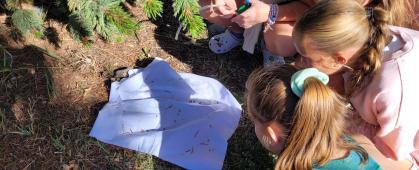Where did you grow up?
I grew up in Kentucky. I was born in a very rural part of Kentucky, and that's where I spent the first several years of my life before I moved to the big city of Lexington, Kentucky.
How did you get into STEM and research?
I had a super windy path, actually. I was pre-med for most of my life. I had every intention of going to medical school throughout high school and then early college. I shadowed lots of different people in lots of different medical domains, trying to find what kind of doctor I would be. I spent some time in the operating room, and I spent some time with pathologists and radiologists. My father is a family practice doc so I saw that side as well.
And I just couldn't see myself in any of those fields. So when it came time to apply for medical school I took a year off, and I worked on a dude ranch. I didn’t want to commit to medical school without a real end goal in mind.
At the same time, I was working as an artist, and found my way to New York, and then I started working. I was really interested in the decision around aesthetics and what makes something aesthetically pleasing or not. I started working for this neuroscientist focusing on aesthetics and decision making.
The more I started working with him, I realized, wow, we just don't understand the decision-making process, let alone the aesthetics part. That’s part of what led me to cognitive neuroscience. I was simultaneously working as a math and science tutor, to make ends meet. It was through teaching and this research experience that led me to get my master's in Neuroscience and Education, and then that's what led me to my PhD in cognitive neuroscience. So a very windy path.
Why did you initially want to be a doctor and be in STEM fields?
I'm really interested–I still am–in helping people. In my work, I try to have my research be useful for patient outcomes. Although my research currently doesn’t deal with specific patients, but I hope my work will help patients more directly in the future.
What do you recommend for young people interested in a career like yours?
I would definitely recommend you have a clear objective in mind. You don't need to know exactly what you want to do but having goals can help get you through long and arduous processes.
I didn’t have that clear goal which is why I took a winding path. But I was lucky… it exposed me to other things that I was really interested in. I had never coded before my master's program, so it took me that winding path to figure out. Oh, this. This feels right. This feels like this is something that I could do for the rest of my life.
So be comfortable experimenting to find that goal.
Also, I would say, keep at it. Some of these careers seem daunting. It seems like now you have to be an expert in all of these different things. You have to be an expert in neuroscience, you have to be a good writer to write grants. You have to be a good public speaker. You have to be a good teacher. If you think about it, it's too intimidating. Try to focus and do projects that you're really excited about and have a clear finish line. Don’t focus too much on the bigger stuff.
What are the Challenges for Women in STEM?
In my experience in the academic world, someone who wants to start a family may have a hard time. Though I have encountered so many people that are very helpful and they are trying to push against this current that is coming at you. But you still can feel the current. Especially because the timing of starting a family can often coincide with the post doc stage and you’re trying to push your career past that one final hurdle.
Then with computer science, I thought the biggest hurdle was barrier to entry. Simple things like setting up an environment so that you can start coding. Onboarding can be very intimidating.
I personally want to try to make that barrier to entry as low as possible for people, and particularly women that are interested in it.
